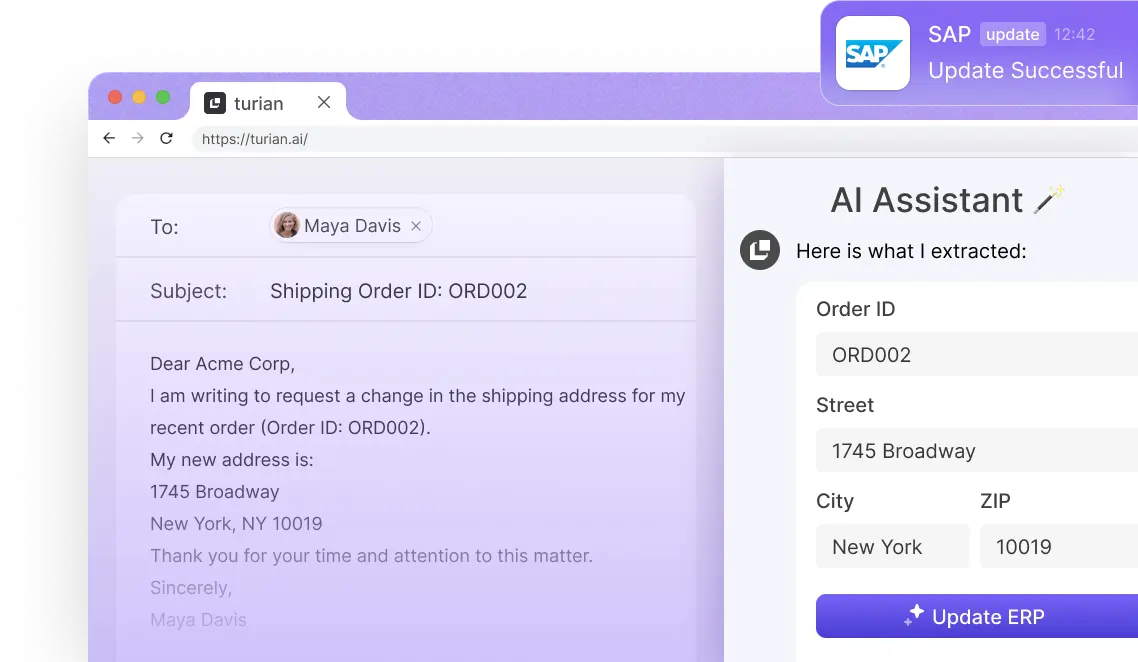

5 Benefits of Using AI in Manufacturing
In an era defined by rapid technological advancements, artificial intelligence (AI) has emerged as a game-changer for many industries, including manufacturing. For manufacturers, adopting AI isn't just about keeping up with innovation; it's about staying competitive in an increasingly dynamic market. From predictive maintenance and quality control to supply chain optimization and beyond, AI is transforming the way manufacturing processes are managed and executed.
Here, we'll discuss the benefits of AI in manufacturing, its use cases, and how it will impact the industry in the future. But before we get into that, let's address the most fundamental question:
Why Do Companies Use AI in Manufacturing?

Image source: storyset
AI can be used in almost any industry, but the manufacturing sector has seen a particularly high surge in AI adoption. The reason? Well, both AI and manufacturing revolve around one critical component: data. The manufacturing industry generates tremendous amounts of data, including equipment performance, production workflows, supply chain logistics, and other external data.
AI technologies like machine learning and deep learning neural networks require data to train and refine their models and provide accurate outputs. AI can help manufacturing companies improve their processes, boost efficiency, enhance product quality, drive operational excellence, and give them the edge they need to stay competitive in today's fast-paced business world. In other words, AI in manufacturing allows companies to better use their data and achieve better outcomes.
Benefits of AI in Manufacturing
AI offers a range of benefits that can help manufacturing companies achieve their goals, drive success, and stay ahead of the curve. Here are five key benefits of using AI in manufacturing:
1. Improved Efficiency in Back-office Tasks
One of the primary benefits that AI brings to the manufacturing industry is improved operational efficiency particularly for back-office tasks. By automating time-consuming, repetitive tasks, AI solutions reduce or eliminate the need for manual effort. With AI in manufacturing, employees no longer need to manually monitor inventory or forecast demand, allowing them to focus on strategic tasks like improving supply chain relationships or exploring new market opportunities. One example is Unilever: they leverage AI-driven tools to automate inventory management and predict demands. This leads to improved supply chain efficiency and shorter production cycles.
2. Increased Product Quality
In addition to improving operational efficiency, AI also plays a big role in enhancing the quality of products. AI-driven quality-control systems can identify and flag any defects or inconsistencies in the production process and provide real-time feedback for immediate corrective action. This ensures that only high-quality products make it to the market, improving customer satisfaction and brand reputation.
3. Improved Quality Assurance
Quality assurance is vital in manufacturing to ensure that products meet the required standards and specifications. With AI, manufacturers can identify design flaws and potential issues in the early stages before they go into full production. This is done via rapid prototyping or digital twins, which allow manufacturers to test and refine designs before producing physical models. By catching issues early on, companies can save time and costs associated with rework and recalls.
4. Optimized Costs
Artificial intelligence in manufacturing optimizes cost-efficiency in ways that go beyond just automation. The fusion of AI technologies such as digital twins, rapid prototyping, and predictive maintenance can lead to substantial cost savings in the long run. By predicting equipment failures and pinpointing potential issues early on, companies can avoid costly downtime and repairs. AI can also help optimize supply chain management by analyzing data to forecast demand and optimize inventory levels. In short, AI helps manufacturers cut costs in various areas, leading to improved profitability.
5. Customization and Market Responsiveness
AI allows manufacturers to provide customized solutions that cater to their customers' specific needs. By analyzing customer preferences, behavior patterns, and market trends, AI can help manufacturers develop personalized products and services that meet their customers' demands. With the ability to analyze vast amounts of data in real time, AI-driven systems can also help manufacturers respond quickly to market changes and adapt their production processes accordingly.
How Is AI Used in Manufacturing? Use Cases

Image source: Storyset
Ok. Now we know why companies are using AI in manufacturing and its benefits. But how is AI used in manufacturing exactly? There is a wide range of use cases for AI in manufacturing.
These may include, but are not limited to:
Predictive Maintenance for Equipment
Predictive maintenance is one of the most common use cases for AI in manufacturing. This method utilizes sensors to monitor the performance of equipment and predict potential failures before they occur. AI-driven predictive maintenance systems analyze massive amounts of data collected from sensors and use machine learning algorithms to detect anomalies, irregular patterns, or probable equipment failure. By identifying potential issues early on, manufacturers can schedule maintenance and repairs before equipment breaks down, reducing downtime and production delays.
An example of this application can be found in Siemens. The company uses AI-based predictive maintenance to monitor machinery and predict potential failures before they occur. By analyzing data from sensors installed on equipment, Siemens' AI systems detect anomalies and schedule maintenance needs, which can lead to a reduction in downtime and prevention of unexpected breakdowns.
Supply Chain Optimization
AI can also play a big role in optimizing supply chain processes in manufacturing. By analyzing large amounts of supply chain data and identifying patterns and trends, AI can provide real-time insights to enhance demand forecasting, inventory management, logistics, and warehouse management. If there are any potential risks or disruptions in the supply chain, AI can flag them and allow manufacturers to make necessary adjustments proactively. AI can also help optimize supplier selection, ensuring that manufacturers work with reliable and efficient partners. By optimizing supply chain processes, manufacturers can reduce costs, improve delivery times, and enhance overall efficiency.
Coca-Cola is an example of optimizing supply chain operations with AI. The company uses AI-powered tools to analyze data related to demand forecasting, inventory, and logistics. AI helps with identifying patterns and trends to make data-driven decisions and improve efficiency.
Production Line Customization and Optimization
AI can help manufacturers optimize and customize their production lines to meet the specific needs and demands of customers. By analyzing both internal and external data (e.g., customer preferences or sales data), AI can help manufacturers develop or customize products that are tailored to their customers' needs. With the help of rapid prototyping and digital twin technology, AI can also help manufacturers simulate and test different production line setups to find the most efficient and cost-effective solution. This level of customization and optimization not only improves customer satisfaction but also reduces waste, minimizes costs, and increases overall efficiency.
BMW, for example, has integrated AI-driven humanoid robots into production lines to perform complex tasks with high precision, allowing for more flexible and optimized production processes tailored to customer preferences.
BMW experienced a 400% speed increase in their production line duties thanks to this AI-powered robot implementation (Source: The Sun).
Automated Quality Assurance
As said earlier, AI-driven quality control systems can help manufacturers improve the quality of their products. By constantly monitoring and analyzing production line data, AI-based systems can detect any potential quality issues or deviations and provide alerts for corrective action. AI also offers insights and suggestions to improve the production process and ensure consistent product quality. By automating the quality assurance process, manufacturers can save time, reduce costs associated with manual inspection, and ensure that only high-quality products make it to the market.
A good example is Honeywell. They integrated advanced AI into its operations, which allows it to monitor and analyze production data in real-time, detecting potential quality issues or deviations and providing alerts for corrective action. This automation ensures consistent product quality, reduces manual inspection time, and lowers associated costs.
How Will AI Affect Manufacturing?
According to Precedence Research, the global AI in manufacturing market is projected to grow from USD 5.94 billion in 2024 to USD 230.95 billion by 2034, with a CAGR of 44.20% between 2024 and 2034. If we look at these numbers and the potential benefits of AI in manufacturing stated above, it's clear that AI is set to have a transformative impact on the industry. However, it is important to note that not all manufacturers are fully prepared to harness this potential.
While AI promises improved efficiency, better product quality, and innovations in manufacturing processes, many companies still face hurdles, like outdated legacy systems, talent shortages, and data security concerns. To overcome these barriers, manufacturers must ensure that the AI solution they adopt aligns with their business objectives and integrates seamlessly into existing IT and ERP infrastructures. This way, they can fully leverage the benefits of AI while avoiding potential pitfalls.
Moreover, with advancements in technology, generative AI is becoming a game-changer in the manufacturing sector. Unlike traditional AI, which relies on predefined rules and structured data, generative AI can create new content, ideas, designs, or solutions based on patterns learned from large datasets. This not only improves the speed and accuracy of decision-making but also makes AI more accessible to employees at all levels. From operations and supply chain management to the factory floor, everyone can use AI to drive efficiency and productivity, leading to a more competitive and agile manufacturing process. As a result, we can expect to see further widespread adoption of AI across the industry in the near future.
Transform Your Business Using AI in Manufacturing
AI is transforming the way manufacturing is done. From predictive maintenance and supply chain optimization to production line customization and automated quality assurance, AI offers a plethora of benefits that can help manufacturers stay ahead in the highly competitive market. With the growing adoption of Industry 4.0, often associated with smart manufacturing and smart factories, AI is not just a luxury but a necessity for manufacturers looking to thrive in this digital era.
If you're looking to harness the power of AI in your manufacturing back-office processes, then turian's AI solutions are here to help. Our AI-powered solution is tailored for mid-sized manufacturers and can automate key processes like sales order management, procurement, and RFQs, as well as ensure compliance with industry standards like CSDDD, CBAM, and RoHS. With seamless ERP integration and real-time insights, turian allows manufacturers to make data-driven decisions, improve efficiency, and enhance customer satisfaction. By automating time-eating, repetitive tasks like data entry, quote generation, payment approvals, and compliance checks, our AI solutions allow your employees to focus on high-value tasks that drive growth and innovation.
If you want to see how turian's AI solutions can transform your manufacturing business, we offer a free Proof of Concept without any kind of strings attached. With this POC, you can experience the benefits of AI in your specific manufacturing processes before making any commitment.
{{cta-block-blog}}

Say hi to your
AI Assistant!


Lernen Sie Ihren KI-Assistenten kennen!
.avif)
FAQ
AI plays a vital role in predictive maintenance. By analyzing huge amounts of data from sensors and machine operations, AI can identify patterns and predict potential failures before they occur. This helps manufacturers schedule proactive maintenance and avoid unexpected downtime, keeping manufacturing operations running smoothly. With predictive analytics, AI-powered systems can recommend optimal maintenance schedules, predict the remaining useful life of critical equipment, and prioritize tasks based on risk levels. This ensures efficient resource allocation while reducing unnecessary repairs. By continuously learning from new data, AI improves prediction accuracy, minimizing costs, extending equipment lifespan, and enhancing overall operational efficiency.
There are various types of AI technologies used in manufacturing, including machine learning, computer vision, natural language processing, digital twins, deep learning neural networks, generative design, robotics, and automation. Some of these technologies are used individually, while others are combined to create a more powerful and efficient AI system for manufacturing.
While AI offers vast potential for manufacturers, there are some challenges they can face when implementing it. These include data quality and availability, lack of skilled talent, integration with legacy systems (like ERP), data security concerns, and regulatory compliance. To overcome these challenges, manufacturers must carefully plan their implementation and choose an AI solution that aligns with their business objectives and integrates seamlessly into their existing systems. They must also prioritize data management and invest in upskilling their employees to fully leverage the perks of AI. With proper planning and execution, manufacturers can overcome these challenges and use the transformative power of AI in their manufacturing environment without any major setbacks.
AI can improve supply chain management in various ways. By analyzing data from different sources, including suppliers and logistics partners, AI can provide real-time insights to optimize inventory levels, improve demand forecasting, and identify potential disruptions in the supply chain. From supplier selection to warehouse management, AI can enhance efficiency and reduce costs in every aspect of the supply chain. The future of manufacturing with AI is expected to see continued advancements in supply chain optimization, making it a critical use case for AI in the industry.





